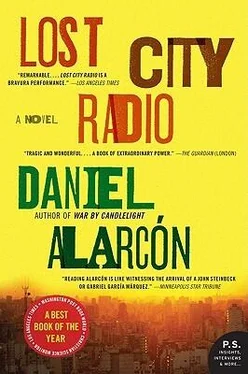He also fell in love with Norma. She was studying journalism; he was finishing his thesis in ethnobotany. The university then was falling apart, strained well past capacity, underresourced and overcrowded. The buildings were crumbling, the classes choked with students. Professors were shouted down in midlecture, and graffitied walls announced the coming war. The president warned ominously of occupying the grounds, using force to punish the dissidents. In his famous Independence Day speech just before Norma met Rey, the president stepped on the dais in the main plaza and condemned “that illegitimate legion of rabble-rousers that provoke chaos and disrupt the general order!” He pounded his fist in the air, as if beating an imaginary enemy, and was met with thunderous applause. The president announced new measures to combat subversion, and the teeming crowd surged with approval.
The following day, the newspapers published the entire text of his speech, along with panoramic photographs of the plaza from the air, a weltering sea of flesh beneath the summer sun. It was impressive: the masses overwhelming the confines of the plaza, overrunning the fountain, pushing up against the steps of the cathedral. Of course, the president had rigged his reelection, but from the looks of it, he needn’t have bothered with fraud. Men hung from street lamps, clutching banners, tambourines, and drums. Round-faced children smiled for the cameras, waving tiny flags they had made in school with crayons and newsprint and plastic straws. This was almost a year before the war began, when the government seemed invincible. The crowd, it was later revealed, had been paid for their ser vices, for their enthusiasm. They’d been bused in, had accepted donations of rice and flour for a day’s work cheering the speech. Many of them came from distant villages and didn’t even speak the language. They cheered on cue like good workers, collected their payment, and went home.
Rey and Norma met through mutual friends at a dance that same week. Rey was handsome in a broken kind of way: the kind of young man who had looked old his entire life. His nose bent subtly to the left, and his eyes hid in the recessed shadows beneath his brow. Still, he had a strong jaw and an incongruously silly, dimpled smile and, for this, Norma liked him. He smoked incessantly, a habit he would later give up, but that first night it seemed integral to who he was. A group of them sat together, talking about the city and the government and the university and the future. They spoke of the crowds that had filled the plaza: the people, always myopic, always easy to fool. Indians, Rey said, imagine! They don’t even know who the president is! It was all laughter and noise and the melting of ice cubes. They made fun of the president, who was weak and expendable and whose troubles were only beginning. The Illegitimate Legion! It was only a punch line then: how would these enemies be any different from those who had come before? Hadn’t the war been just around the corner for fifteen years? It was impossible to take seriously, so they drank more and joked more, and spoke most obliquely about sex. Norma felt deliciously lost in the music, in the rising heat. She leaned in closer to the new stranger. He didn’t pull away. She drank furiously. His foot tapped the rhythm, and she realized she’d been speaking for a while and had heard nothing for longer. Conversation was impossible. Their table emptied in pairs, their friends slipping onto the dance floor, until it was only the two of them. It was nearly midnight before Rey finally asked her to dance. They were in an old building with high ceilings, the band playing loud and brash, energized by the cathedral-like acoustics. Brassy bursts of sound cut through the din of the dancers and the drinkers. Rey took Norma by the arm and led her to the middle of the floor. He spun her and held her close, young in his movements, his old face adorned with a wry smile. During the third song, he pulled her in and whispered in her ear, “You don’t know who I am, do you?”
The rhythm caught them and spread them apart again, the heat of his breath still tickling her ear. What did he mean? She felt his hand on her back, guiding her across the floor. The hall was filled with flashing colored lights, like a dream she’d had once or a film she’d seen. They moved. Rey was gliding through the crowd, in time with the song. Bam! A snare, a cymbal, a pulse within the music: the tight skin of the drum singing war! She was drunk, she realized, and her feet were moving without her. He led and she followed, and when the music brought them back together, she took her chance to tell him she knew only that his name was Rey.
He laughed. He raised his hand up Norma’s back and pulled her closer, so close her lips almost touched his. She could breathe him. Then he spun her away, twirled her like a plaything.
They danced for the rest of the night and hardly spoke at all.
When the party broke up, he offered to accompany Norma home. This was before downtown was abandoned; there were little bodegas still open, selling gum and toasted plantains, aspirin and cigarettes. Rey bought a candy bar, and they shared it as they waited for the bus. There were young people everywhere, on every corner, sharing smokes, raising their voices in cheerful arguments — that four a.m. logic, that drunken lucidity. Norma’s curfew had come and gone. It was summer, and there was even a moon in the sky, or a sliver of one, and the couples that walked by clutched each other tightly, beautiful people all of them. It seemed the war would never come.
Norma and Rey cramped together in the back row of a crosstown bus, their legs pressed up against each other. Rey wrapped his left arm around her. She felt his thumb rubbing her shoulder. Norma had nowhere to put her hands, and so she dropped them on his thigh. Her index finger stroked the fabric of his jeans, and it amazed her, because she was not this type of girl. His black hair had been combed back earlier, but with all the dancing, it was starting to fall in his eyes. It was nearly dawn, and the bus rolled lazily along empty avenues. He played absentmindedly with the silver chain around his neck, then pulled a cigarette from behind his ear. There was a match stuck in the end. While he looked around for a place to strike it, she asked him what he had meant by such a strange question.
Rey smiled and pretended not to remember. His eyes closed, as if he were still hearing the loud crash of a cymbal or the blare of a trumpet. “Nothing,” he said.
“I’ll guess then.”
He nodded. They were in the back, the window open to the night air. He bent forward and lit the match against the back of the seat, where two names had been scratched into the metal with a pocketknife: LAUTARO & MARIA, FOREVER. Rey slung his right arm out the window and blew smoke over his shoulder. He watched her.
“You must be somebody’s son,” Norma said. “And by somebody, I mean somebody famous. Why else would you ask me?”
“Somebody’s son?” he asked, grinning. “Is that what you think?” He laughed. “How astute. Aren’t we all somebody’s children?”
“What’s your last name?”
“You’ll have to ask your friends.”
“Why would you ask me that unless you were well known?”
He smiled coyly. “I don’t aspire to fame.”
“You’re clearly not an athlete.”
He took a puff from his cigarette, blue smoke trailing from his lips. “Is it obvious?” he asked, amused. He flexed his bicep and pretended to be impressed with himself.
Norma laughed. “Are you a politician?”
“I hate politicians,” he said. “And, in any case, there’s no such thing anymore: only sycophants and dissidents.”
“A dissident then.”
He grinned and made a show of shrugging his shoulders.
Читать дальше












